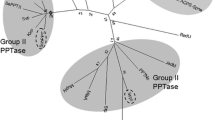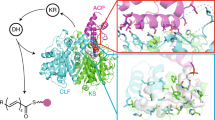Abstract
Phosphopantetheinyl transferases (PPTases) catalyze the posttranslational modification of acyl carrier proteins (ACPs) in fatty acid synthases (FASs), ACPs in polyketide synthases, and peptidyl carrier proteins (PCPs) in nonribosomal peptide synthetases (NRPSs) in all organisms. Some bacterial PPTases have broad substrate specificities for ACPs/PCPs and/or coenzyme A (CoA)/CoA analogs, facilitating their application in metabolite production in hosts and/or labeling of ACPs/PCPs, respectively. Here, a group II PPTase SchPPT from Streptomyces chattanoogensis L10 was characterized to accept a heterologous ACP and acetyl-CoA. Thus, SchPPT is a promiscuous PPTase and may be used on polyketide production in heterologous bacterial host and labeling of ACPs.




Similar content being viewed by others
References
Beld J, Sonnenschein EC, Vickery CR, Noel JP, Burkart MD (2014) The phosphopantetheinyl transferases: catalysis of a post-translational modification crucial for life. Nat Prod Rep 31:61–108
Clarke KM, Mercer AC, La Clair JJ, Burkart MD (2005) In vivo reporter labeling of proteins via metabolic delivery of coenzyme A analogues. J Am Chem Soc 127:11234–11235
Foley TL, Yasgar A, Garcia CJ, Jadhav A, Simeonov A, Burkart MD (2010) Preparation of FRET reporters to support chemical probe development. Org Biomol Chem 8:4601–4606
Gehring AM, Lambalot RH, Vogel KW, Drueckhammer DG, Walsh CT (1997) Ability of Streptomyces spp. acyl carrier proteins and coenzyme A analogs to serve as substrates in vitro for E. coli holo-ACP synthase. Chem Biol 4:17–24
Gokhale RS, Tsuji SY, Cane DE, Khosla C (1999) Dissecting and exploiting intermodular communication in polyketide synthases. Science 284:482–485
Hauvermale A, Kuner J, Rosenzweig B, Guerra D, Diltz S, Metz JG (2006) Fatty acid production in Schizochytrium sp.: involvement of a polyunsaturated fatty acid synthase and a type I fatty acid synthase. Lipids 41:739–747
Huang Y, Wendt-Pienkowski E, Shen B (2006) A dedicated phosphopantetheinyl transferase for the fredericamycin polyketide synthase from Streptomyces griseus. J Biol Chem 281:29660–29668
Jiang H et al (2008) The role of tandem acyl carrier protein domains in polyunsaturated fatty acid biosynthesis. J Am Chem Soc 130:6336–6337
Jiang H et al (2013) Improvement of natamycin production by engineering of phosphopantetheinyl transferases in Streptomyces chattanoogensis L10. Appl Environ Microbiol 79:3346–3354
Jiang H et al (2015) An acyltransferase domain of FK506 polyketide synthase recognizing both an acyl carrier protein and coenzyme A as acyl donors to transfer allylmalonyl and ethylmalonyl units. FEBS J. doi:10.1111/febs.13296
Kealey JT, Liu L, Santi DV, Betlach MC, Barr PJ (1998) Production of a polyketide natural product in nonpolyketide-producing prokaryotic and eukaryotic hosts. Proc Natl Acad Sci USA 95:505–509
Ku J, Mirmira RG, Liu L, Santi DV (1997) Expression of a functional non-ribosomal peptide synthetase module in Escherichia coli by coexpression with a phosphopantetheinyl transferase. Chem Biol 4:203–207
Lu YW, San Roman AK, Gehring AM (2008) Role of phosphopantetheinyl transferase genes in antibiotic production by Streptomyces coelicolor. J Bacteriol 190:6903–6908
Meiser P, Muller R (2008) Two functionally redundant Sfp-type 4ʹ-phosphopantetheinyl transferases differentially activate biosynthetic pathways in Myxococcus xanthus. ChemBioChem 9:1549–1553
Mootz HD, Finking R, Marahiel MA (2001) 4ʹ-phosphopantetheine transfer in primary and secondary metabolism of Bacillus subtilis. J Biol Chem 276:37289–37298
Murugan E, Liang ZX (2008) Evidence for a novel phosphopantetheinyl transferase domain in the polyketide synthase for enediyne biosynthesis. FEBS Lett 582:1097–1103
Quadri LE, Weinreb PH, Lei M, Nakano MM, Zuber P, Walsh CT (1998) Characterization of Sfp, a Bacillus subtilis phosphopantetheinyl transferase for peptidyl carrier protein domains in peptide synthetases. Biochemistry 37:1585–1595
Sanchez C, Du L, Edwards DJ, Toney MD, Shen B (2001) Cloning and characterization of a phosphopantetheinyl transferase from Streptomyces verticillus ATCC15003, the producer of the hybrid peptide-polyketide antitumor drug bleomycin. Chem Biol 8:725–738
Sunbul M, Zhang K, Yin J (2009) Using phosphopantetheinyl transferases for enzyme posttranslational activation, site specific protein labeling and identification of natural product biosynthetic gene clusters from bacterial genomes. Methods Enzymol 458:255–275
Walsh CT, Gehring AM, Weinreb PH, Quadri LE, Flugel RS (1997) Post-translational modification of polyketide and nonribosomal peptide synthases. Curr Opin Chem Biol 1:309–315
Wang YY et al (2014) Characterization and evolutionary implications of the triad Asp-Xxx-Glu in Group II phosphopantetheinyl transferases. PLoS One 9:e103031
Weissman KJ, Hong H, Oliynyk M, Siskos AP, Leadlay PF (2004) Identification of a phosphopantetheinyl transferase for erythromycin biosynthesis in Saccharopolyspora erythraea. ChemBioChem 5:116–125
Worthington AS, Rivera H, Torpey JW, Alexander MD, Burkart MD (2006) Mechanism-based protein cross-linking probes to investigate carrier protein-mediated biosynthesis. ACS Chem Biol 1:687–691
Zhou Z et al (2007) Genetically encoded short peptide tags for orthogonal protein labeling by Sfp and AcpS phosphopantetheinyl transferases. ACS Chem Biol 2:337–346
Acknowledgments
This work was supported by Zhejiang Provincial Natural Science Foundation of China LR16H300001 and LZ12C01001, National Natural Science Foundation of China 31200600 and 31470212, and National High Technology Research & Development Program of China (863 Program) 2012AA02A706 and 2012AA022107.
Author information
Authors and Affiliations
Corresponding author
Additional information
Communicated by Erko Stackebrandt.
Yue-Yue Wang and Hong-Dou Luo have contributed equally.
Rights and permissions
About this article
Cite this article
Wang, YY., Luo, HD., Zhang, XS. et al. The substrate promiscuity of a phosphopantetheinyl transferase SchPPT for coenzyme A derivatives and acyl carrier proteins. Arch Microbiol 198, 193–197 (2016). https://doi.org/10.1007/s00203-015-1179-z
Received:
Revised:
Accepted:
Published:
Issue Date:
DOI: https://doi.org/10.1007/s00203-015-1179-z




